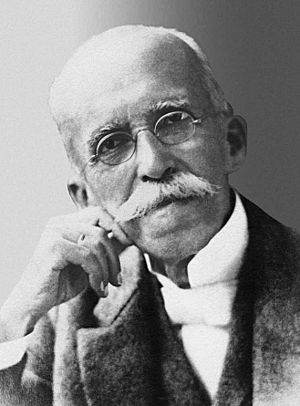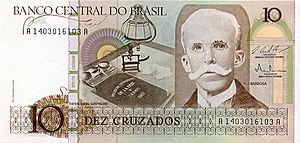Ruy Barbosa facts for kids
Quick facts for kids
Ruy Barbosa
|
|
|---|---|

Ruy Barbosa in 1907
|
|
| Vice President of the Federal Senate | |
| In office 25 October 1906 – 25 June 1909 |
|
| Preceded by | Joaquim Murtinho |
| Succeeded by | Quintino Bocaiuva |
| Senator | |
| In office 15 November 1890 – 1 March 1923 |
|
| Constituency | Bahia |
| Minister of Finance | |
| In office 15 November 1889 – 21 January 1891 |
|
| President | Deodoro da Fonseca |
| Preceded by | Viscount of Ouro Preto |
| Succeeded by | Tristão de Alencar Araripe |
| General Deputy | |
| In office 15 December 1878 – 3 September 1884 |
|
| Constituency | Bahia |
| Personal details | |
| Born | 5 November 1849 Salvador, Bahia, Brazil |
| Died | 1 March 1923 (aged 73) Petrópolis, Rio de Janeiro, Brazil |
| Political party | Liberal (1871–1889) |
| Spouse |
Maria Augusta Viana Bandeira
(m. 1876) |
| Children | 5 |
| Parents |
|
| Relatives | Marina Ruy Barbosa (great-great-great-granddaughter) |
| Alma mater | Faculty of Law of Largo de São Francisco |
Ruy Barbosa de Oliveira (born November 5, 1849 – died March 1, 1923), also known as Rui Barbosa, was a very talented Brazilian. He was a polymath (someone who knows a lot about many different subjects), a diplomat (who represents their country), a writer, a jurist (a legal expert), and a politician.
Born in Salvador, Bahia, Ruy Barbosa was a strong supporter of civil liberties and worked hard to end slavery in Brazil. He represented Brazil at an important international meeting called the Hague Convention. He also believed Brazil should join the Allies during World War I. As Minister of Finance, he even ordered the destruction of government records about slavery.
Later, he had to leave Brazil for a while because of some economic problems that happened when he was finance minister. After returning, he ran for president, but he did not win.
Early Life and Fight for Freedom
Ruy Barbosa gave his first public speech against slavery when he was just 19 years old. For the rest of his life, he always defended people's freedoms. Slavery in Brazil finally ended in 1888 with a law called the Lei Áurea (which means "Golden Law").
One important thing Ruy Barbosa did was to order the destruction of most government records about slavery. He did this on December 14, 1890, when he was the Minister of Finance. He said this was to remove the "stain" of slavery from Brazilian history.
However, historians today believe he also wanted to stop former slave owners from getting money as payment for freeing their slaves. Just eleven days after slavery was abolished, a plan was suggested to pay money to slave owners. By destroying the records, Ruy Barbosa helped prevent this from happening.
Ruy Barbosa's Political Journey
Ruy Barbosa's ideas about freedom and government were very important. They helped shape Brazil's first republican constitution. He believed in certain economic ideas that led to some challenges for Brazil's money system.
Because of these challenges, he had to go into exile (leave the country) for a time. After he returned, he was elected as a Senator. He led the Brazilian group at the second Hague Conference, where he was very impressive.
In 1910, Ruy Barbosa ran for president as a candidate for the Civilian Party. He ran a very memorable campaign, but he lost the election. He tried again in 1914 and 1919, but he did not win either time.
During World War I, Ruy Barbosa strongly argued that Brazil should support the Allied countries. He believed Brazil should be more involved in the war. Ruy Barbosa passed away in Petrópolis, a city near Rio de Janeiro, in 1923.
See also
 In Spanish: Ruy Barbosa para niños
In Spanish: Ruy Barbosa para niños
- Oração aos moços
 | Kyle Baker |
 | Joseph Yoakum |
 | Laura Wheeler Waring |
 | Henry Ossawa Tanner |


